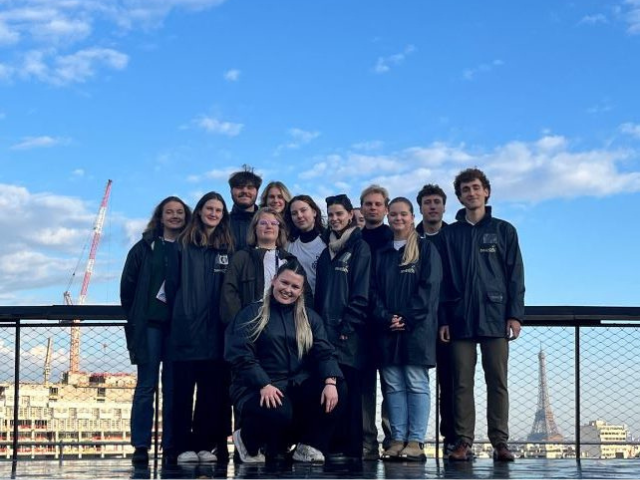The name of Lithuania resounded at ‘iGEM’ (International Genetically Engineered Machine) – an international prestigious competition of synthetic biology held in France. From 23 to 26 October, the ‘Vilnius-Lithuania iGEM’ team, competing in the finals for the tenth consecutive year, ranked among the top ten teams and won the Best Biomanufacturing Project Award.
The student team also earned a gold medal for Excellence in Synthetic Biology, the Best Software Award, was nominated for the Best Wiki Award, and earned the Best Part Collection Award.
The VU students’ project ‘Synhesion’ stood out among over 400 teams from more than 60 countries, including teams from prestigious high-level educational institutions such as Massachusetts Institute of Technology (MIT), Harvard University, Stanford University, the University of Cambridge, and the University of Oxford.
'This year, we have set incredible goals. Each team member is an innovator, a creative visionary, and a fighter. We have bravely and decisively overcome all challenges, reached compromises, and, most importantly, forged new connections. Beyond the awards, which we are definitely proud of, we also gained invaluable experience, friendships, and unforgettable memories from our student life. I am confident that every member of my team leaves with the most rewarding experiences and life lessons. I believe that each of us will go on to create more than one scientific miracle for Lithuania and the world,’ said the team leader Evelina Prosevičiūtė.
This year, the ‘Vilnius-Lithuania iGEM’ team chose E. coli bacteria as their research object, aiming to develop environmentally sustainable polysaccharides-based adhesives through their ‘Synhesion’ project. The bacteria Caulobacter crescentus and Hirschia baltica, found naturally in water, produce strong adhesive substances called holdfasts, which allow them to attach to various surfaces in the water. Research has shown that these bio-adhesives are three times stronger than store-bought glue.
When asked about the drawbacks of conventional glue and why we need an alternative, the team leader explained that many adhesives we use either contain toxic elements or ultimately degrade into harmful compounds. ‘These pollutants not only end up in our soil, affecting animals and ecosystems, but they also pose significant risks to human health. If you look around, you’ll notice how many things around us contain glue, which can even lead to respiratory issues. Moreover, various adhesive bandages, even those used in medicine, can cause allergic reactions,’ added Fausta Michnevičiūtė, one of the team members.
The new bacterial adhesive offers a cleaner alternative that is simply made from sugars, she explained: ‘We have chosen bacteria that produce sugars. Having transferred the E. coli bacterium used in the industry into our systems, we forced it to produce something it does not naturally produce, and thus created a new product.’
Aside from lab work on scientific projects, the ‘iGEM’ competition encourages students to engage in public education to raise awareness of local and global issues and promote scientific knowledge. This year, the VU team organised ‘SynFolk’ – a series of public events that invited people to discover the wonders of science by blending ancient mythology and modern knowledge. The events highlighted the presence of science in our daily lives while also reminding attendees of the long-forgotten or even unknown Baltic gods and their significance to our culture.
In order to engage the youngest audience members, the team created a children’s book explaining the basics of genetics and developed a mobile game introducing players to various bacteria living on different surfaces and what they are made up of.
Over the past decade, the ‘Vilnius-Lithuania iGEM’ team has consistently excelled in the competition, winning gold medals annually and even earning the Grand Prize twice – in 2017 and 2020, when it achieved global recognition – as well as coming second last year.
‘iGEM’ is the largest synthetic biology competition, bringing together participants from all over the world. It encourages participants (around 400 teams from over 65 countries!) to solve real-world problems using their scientific projects and knowledge in molecular biology, engineering, biology, computer science, and mathematics.
 |
